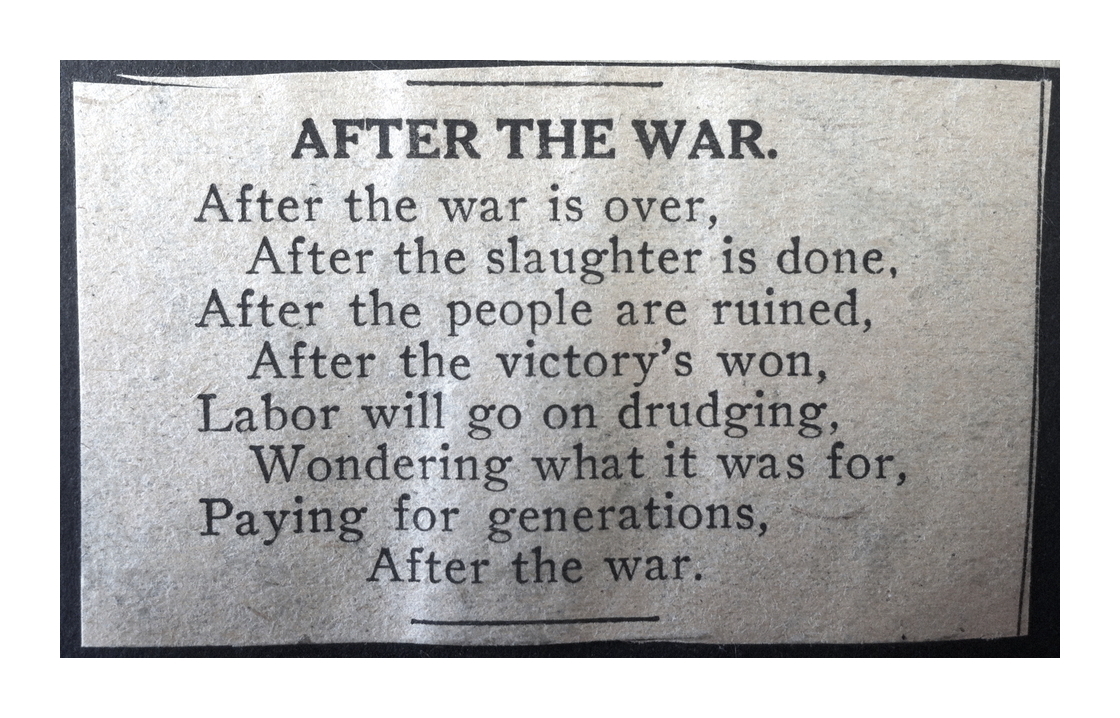Opposition

In the spring of 1917, an observer trying to assess the political and social climate of the country might be struck, at first glance, by the apparent unity of spirit and purpose that gripped the nation as it prepared for war with Germany. Communities across the country rallied together in efforts to enlist men, bolster humanitarian relief work, manufacture munitions, and to generally create a vigorous and serviceable home front. A closer look, however would banish this vision of unilateral enthusiasm, revealing a tiny, yet forceful movement of contrarians fighting against American entry into war on the national stage. Shortly before American entry into war, Secretary of State William Jennings Bryan—arguably the most notable politician of the age—resigned his post in order to redirect his considerable influence and activities towards an energetic antiwar campaign. Prominent organizations on the political left, such as the Socialist Party of America (SPA) and the International Workers of the World (IWW) encouraged those allied with the cause of labor to resist enlistment, refuse to contribute to the war effort, and overwhelm the political establishment with the force of popular anti-war sentiment. Individual socialist, anarchist and progressive politicians and activists joined the antiwar movement, bringing their constituents and followers with them. And when Wilson formally asked Congress for a declaration of war against Germany, five senators spoke out in dissent, exposing themselves to temporary infamy and degradation that, in time, gave way to permanent renown.
How were these national conflicts and debates carried to the University of Michigan? Home to a climate of defiant patriotism, preparedness, and subordination of the individual to the collective good, sentiment at the University of Michigan mirrored that of the nation during wartime. So too, the actions of a defiant few at the University and its environs, motivated by religious or moral conviction, radical political ideology, and antipathy to the Allied cause, were magnified on the public stage by their inherent notoriety and shock value.
The antiwar scene at the University of Michigan was primarily hidden and underground, especially after 1917. Records of any local antiwar activity, before or after American entry into the war, remain surprisingly elusive. Yet pre-1917 debates between the proponents and opponents of a militarized campus publicized in the Michigan Daily leading up to American entry into the war paralleled those going on in Congress at the same time. Household names such as Emma Goldman and Eugene Debs touring the country on anti-war crusades made stops at Hill Auditorium, their stances juxtaposed against those of equally vehement pro-war speakers. Meanwhile, active anti-war activism and passive reluctance to join the war frenzy among the German-American community in Ann Arbor and throughout Southeastern Michigan gave that community a reputation for “pro-German” leanings. Accusations of lack of patriotism at the University, the vast majority unfounded, resulted in the firing of much of the German department.
Though ultimately futile, American antiwar efforts throughout the duration of the war left an emphatic mark on the nation’s psychological and political landscape, creating entirely new movements, groups, and political possibilities, annihilating others, and altering still others forever. Some social and political movements that had subsisted along the margins, such as the woman’s suffrage movement, used an aggressively anti-war stance to rise to the forefront in the shadow of the war. Conversely, the expansive network of socialist, anarchist, and syndicalist organizations that sustained the nation’s radical political movement lost decades’ work of fighting to assert themselves in a postwar climate of fear and hysteria, paving the way for the antiradicalism and union decline of the 1920’s. The same mood of public anxiety and superpatriotism that lashed out at political radicals following the war found a scapegoat in the nation’s German-American element during it, irreparably altering the institutions of civil society of the largest ethnic minority community in the country. Meanwhile, the treatment of objectors to war in military camps and prisons gave rise to a nationwide debate on civil liberties, freedom of speech and religion, and the rights of political and religious minorities.
